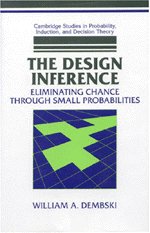The Design Inference
 |
|
| Author | William Dembski |
|---|---|
| Language | English |
| Subject | Intelligent design |
| Publisher | Cambridge University Press |
|
Publication date
|
September 13, 1998 |
| Media type | Print (hardcover and paperback) |
| ISBN | |
| Followed by | Intelligent Design: The Bridge Between Science and Theology |
The Design Inference: Eliminating Chance through Small Probabilities is a 1998 book by American philosopher and mathematician William A. Dembski, a proponent of intelligent design, which sets out to establish approaches by which evidence of intelligent agency could be inferred in natural and social situations. In the book he distinguishes between 3 general modes of competing explanations in order of priority: regularity, chance, and design. The processes in which regularity, chance, and design are ruled out one by one until one remains as a reasonable and sufficient explanation for an event, are what he calls an "explanatory filter". It is a method that tries to eliminate competing explanations in a systematic fashion including when a highly improbable event conforms to a discernible pattern that is given independently of the event itself. This pattern is Dembski's concept of specified complexity. Throughout the book he uses diverse examples such as detectability of spontaneous generation and occurrence of natural phenomena and cases of deceit like ballot rigging, plagiarism, falsification of data, etc.
The filter states that if the thing being examined cannot be explained by regularity, and if it is too statistically unlikely to be explained by chance, and contains an independently given pattern, then it may be attributed to design. Dembski says his concept is useful to those concerned with detecting design in different fields: forensic scientists, detectives, insurance fraud investigators, cryptographers, and SETI investigators, as well theologians and others who argue for the concepts of the fine-tuned universe and the Anthropic Principle.
The Design Inference is specifically mentioned in the Wedge strategy as an example of accomplishing one of the intelligent design movement's five year goals of "Thirty published books on design and its cultural implications (sex, gender issues, medicine, law, and religion). Described by the Discovery Institute as offering "a powerful alternative [to Darwinism]," the book is touted as being "published by major secular university publishers."
Some scientists from the SETI Institute and other fields, argue that they do not find application for Dembski's explanatory filter and the related concept of specified complexity, but rather base their work upon more prosaic methods and (in the case of SETI) a search for artificial simplicity.
...
Wikipedia
